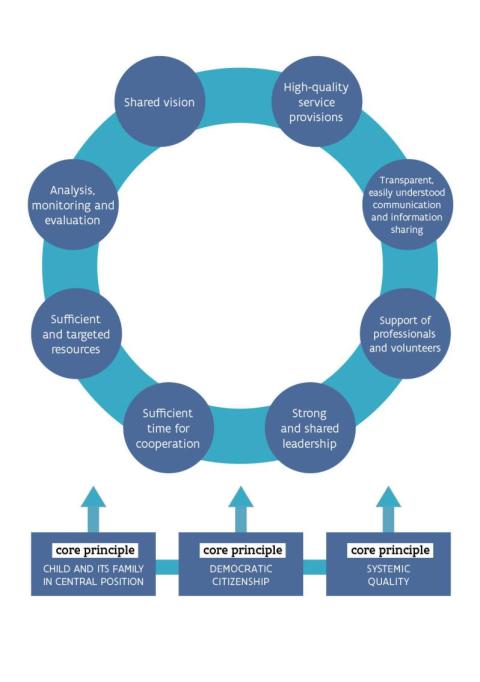The participation of children and families is central. The focus is initially on families and children from the ages of 0 to 12, but this can be broadened depending on the local situation.
A reference framework for community-focused networks for children and families was developed based on practical experience by 10 pioneer community-focused networks, in collaboration with Kind en Gezin (Child and Family). In addition to the initiators, local partners of the network were also involved, including community work, community development, child care, community liaison officer, etc.
We use the Theory of Change as an approach to define positive impact for familiies and children.
A theory of change is used for planning or programme/policy planning to identify the current situation (in terms of needs and opportunities), the intended situation and what needs to be done to move from one to the other. This helps to design interventions and clarify accountabilities and establish a common understanding of the strategies to be used to achieve the goals
A project is running in 6 local communities where local partners are developing a community-focused network. They started in 2019. The project ends in june 2022.
Ambition and goals
The targets of a community-focused network for children and families are ambitious and often reach farther than the current resources and clout of local organisations and associations allow. In addition to the efforts of organisations and partners in the community to ensure a close collaboration on the targets, to set up collective activities and to enable the network to function at a high quality level, this also demands resources at network level.
A community-focused network for children and families:
- Creates within a community together with partners and families a rich environment for all children and families.
- Brings together and integrates in a coherent whole all sorts of essential functions that are important for children and families.
- Acts as basic provision that plays a meaningful role for all children and families using a rightsbased approach
Target group
The focus of a community-focused network is initially on all families and children from the ages of 0 to 12, but this can be broadened depending on the local situation.
The reference framework for community-focused networks aims to offer support for policy makers and organisations in the development of such networks.
Evaluation – lessons learned
The lessons we learned so far are more or less equal to the ones we in the INTESYS toolkit. We quote :
"Time needs to be allocated for stakeholders to meet, discuss, and learn from each other."
"One important insight from the mapping activity in the project is that the most feasible way to move ahead is to bring services together to think about new ways of using and connecting already available services and resources, instead of ‘inventing’ new structures."
According to the framework three sets of elements are important:
- ensuring that there are underpinning values and principles shared by actors at different levels – service level (among staff), interinstitutional level (across sectors, across governance) and by families and communities;
- ensuring that the key factors (building blocks) are positively influencing the work on the service level, across sectors, and at the inter-institutional leadership and governance levels;
- ensuring that quality practices are in place to reinforce the key factors’ influence.
Strengths
By using the theory of chance within a community focused network aiming at real impact we observe :
- The development of more innovative approaches and interventions
- A strong mobilsation of partners to contritube to the interventions and TOC
- A strong focus on the needs of and the results for families and children; their participation in evaluation and their actorship in co creation.
More information

Infographic De toekomst is jong